Jimmy Carter's First Century.
His first book was called ‘Why Not the Best?’ His best is what he has given through all these years.
Jimmy Carter in September, 1978, in his mid-50s and at a high point of his time in office. Through days-long meetings at Camp David, Carter personally brokered the only Middle East peace agreement to have endured. It was between Israel’s premier Menachem Begin (left) and Egypt’s president Anwar Sadat (next to Carter in tan coat). During the talks Carter took the two embattled leaders and their advisors to the hallowed ground of Gettysburg, to dramatize the costs of war. At right, in this photo from Gettysburg, is the Israeli military commander and then-foreign minister Moshe Dayan. (Photo David Hume Kennerly/Getty Images)
On October 1, 1924, James Earl Carter Jr. was born in the small southwestern Georgia town of Plains. It was a different world. Calvin Coolidge was in office, as the 30th US president. Electricity had not yet come to the rural South, which was still officially segregated and the scene of lynchings. Radio broadcasts were in their infancy. TV did not exist. The most popular US car was the Ford Model T.
Today, October 1, 2024, the 39th US president, Jimmy Carter, turns 100. He is by far the longest-tenured former president, having spent nearly 44 years in that role. In distant second place is Herbert Hoover, who lived for 31 years after he left office. Five others former presidents—John Adams, Hoover, Gerald Ford, Ronald Reagan, and the first George Bush—survived into their early 90s. Only Carter has made it this far.
Early last year, when Carter announced that he was entering hospice care, I wrote an appreciation of his time in and out of public office, for The Atlantic. I had worked for Carter as a speechwriter during his 1976 campaign and then as chief speechwriter for his first two years in office. With the magazine’s permission I quoted the story on this site when it first came out. Nineteen months later, on the occasion of Carter’s centennial, I do so again. I have updated two or three date references but otherwise have left this unchanged. I think it stands up.
Respect and best wishes to President Carter on this milestone, and the long road that led to it. His example will endure.
Jimmy Carter: Unlucky President, Lucky Man
The long years of an exceptional life. What I learned by working for him in the 1970s, and by studying his example since then.
On the 1976 campaign trail. (Owen Franken/Corbis, via Getty)
Life is unfair, as a Democratic president once put it. That was John F. Kennedy, at a press conference early in his term.
Jimmy Carter did not go through as extreme a range of the blessings and cruelties of fate as did Kennedy and his family. But I think Carter’s long years in the public eye highlighted a theme of most lives, public and private: the tension between what we plan and what happens. Between the luck that people can make for themselves and the blind chance they cannot foresee or control.
In the decades of weekly Bible classes he led in his hometown of Plains, Georgia, Jimmy Carter must have covered Proverbs 19:21. One contemporary translation of that verse renders it as: “Man proposes, God disposes.”
Not everything in his life happened the way Jimmy Carter proposed or preferred. But he has made the very most of the years that God and the fates granted him.
Americans generally know Jimmy Carter as the gray-haired retiree who came into the news when building houses or fighting diseases or monitoring elections, and whose political past became shorthand for the threadbare America of the 1970s. Most of today’s Americans had not been born by the time Carter left office in 1981. About one-fifth are old enough to have voted when he won and then lost the presidency. It is hard for Americans to imagine Jimmy Carter as young—almost as hard as it is to imagine John F. Kennedy as old.
But there are consistent accounts of Carter’s personality throughout his long life: as a Depression-era child in rural Georgia, as a hotshot Naval Academy graduate working in Hyman Rickover’s then-futuristic-seeming nuclear-powered submarine force, as a small businessman who entered politics but eventually was forced out of it, as the inventor of the modern post-presidency.
What these accounts all stress is that, old or young, powerful or diminished, Jimmy Carter has always been the same person. That is the message that comes through from Carter’s own pre-presidential campaign autobiography, Why Not the Best?, and his many post-presidential books, of which the most charming and revealing is An Hour Before Daylight: Memories of a Rural Boyhood. It is a theme of Jonathan Alter’s insightful biography, His Very Best. It is what I learned in two and a half years of working directly with Carter as a speechwriter during the 1976 campaign and on the White House staff, and in my connections with the Carter diaspora since then.
Whatever his role, whatever the outside assessment of him, whether luck was running with him or against, Carter was the same. He was self-controlled and disciplined. He liked mordant, edgy humor. He was enormously intelligent—and aware of it—politically crafty, and deeply spiritual. And he was intelligent, crafty, and spiritual enough to recognize inevitable trade-offs between his ambitions and his ideals. People who knew him at one stage of his life would recognize him at another.
Jimmy Carter didn’t change. Luck and circumstances did.
Jimmy Carter made his luck, and benefited from luck, when he ran for president. He couldn’t have done it without his own discipline and commitment, and his strategy. He seemed to shake every hand in Iowa—but his team was also the first to recognize that the new Iowa caucus system opened the chance for an outsider to leap into the presidency. At a time when his national name recognition was 1 percent, he spent all day walking up to strangers and saying, “My name is Jimmy Carter, and I’m running for president.” Stop and imagine doing that yourself, even once.
Carter was easier to admire—when delivering his stump speech to a rapt crowd, when introducing himself at a PTA meeting or in a diner—than he was to work for. But that is probably true of most public figures with such a drive to succeed. Because he was so engaging in person, and made such a connection in countless small-group meetings across Iowa, he won the caucuses and went on to win the nomination and the presidency. No other candidate has gone from near-invisibility to the White House in so short a time. (Barack Obama became a Democratic Party star with his famous convention speech in 2004, four years before he won the presidency. Donald Trump had been a celebrity for decades.)
Working the crowd in 1976. (Owen Franken / Corbis / Getty.)
This is how Carter and his team helped themselves. Other developments they hadn’t planned affected the race—mainly to their benefit.
By early 1976, Carter had become the new thing. He embraced rock music and quoted Bob Dylan. He was as powerful and exciting a fusion of cultures as any candidate who came after him. He was a Naval Academy graduate and an Allman Brothers fan. He was deeply of the South and of the Church. He also spoke about Vietnam as a racist war. He quoted poems by Dylan Thomas. He was, yes, cool. He appeared at a Law Day meeting at the University of Georgia’s law school and upbraided the audience about the injustice of America’s legal system. Here’s just one sample of the speech, which would now be considered part of the Sanders-Warren platform:
“I grew up as a landowner’s son. But I don’t think I ever realized the proper interrelationship between the landowner and those who worked on a farm until I heard Dylan’s record … Maggie’s Farm.”
It’s worth reading the whole thing.
But what if Hunter S. Thompson had not noticed this speech and announced that he “liked Jimmy Carter” in an influential article in Rolling Stone? What if Time and Newsweek, also very influential then, had not certified him as a serious potential leader with their coverage? What if the civil-rights figures Martin Luther King Sr. and Andrew Young had not endorsed Carter to Black audiences around the country, and reassured white liberals that he was the southern voice an inclusive America needed? (As governor of Georgia, Carter had placed a portrait of MLK Jr. in the state capitol.) What if Jerry Brown had not waited so long to enter the primaries? What if Teddy Kennedy had dared to run? What if Mo Udall had figured out the Iowa-caucus angle before Carter did? What if Scoop Jackson had not been so dull? Or George Wallace so extreme?
And for the general election, what if Gerald Ford had not pardoned Richard Nixon, turning Watergate into Ford’s own problem? (The Carter team knew that this was a campaign plus. But in the first sentence of his inaugural address, Carter thanked Ford for all he had done “to heal our land.”) What if Saturday Night Live, then in its first season and itself hugely influential, had not made Ford the butt of ongoing jokes? What if Ford had not blundered in a crucial presidential debate? What if Carter’s trademark lines on the stump—I’ll never lie to you and We need a government as good as its people—had not been so tuned to the battered spirit of that moment, and had been received with sneers rather than support?
What if, what if. There are a thousand more possibilities. In the end the race was very close. Luck ran his way.
Then he was in office. Intelligent, disciplined, self-contained, spiritual. President Carter made some of his own luck, good and bad—as I described in this magazine 45 years ago. There is little I would change in that assessment, highly controversial at the time, except to say that in 1979 Carter still had nearly half of his time in office ahead of him, and most of his adult life. I argued then that his was a “passionless” presidency. He revealed his passions—his ideals, his commitments—in the long years to come.
In office he also had the challenge of trying to govern a nearly ungovernable America: less than two years after its humiliating withdrawal from Saigon, in its first years of energy crisis and energy shortage, on the cusp of the “stagflation” that has made his era a symbol of economic dysfunction. It seems hard to believe now, but it’s true: The prime interest rate in 1980, the year Carter ran for reelection, exceeded 20 percent. You never hear, “Let’s go back to the late ’70s.”
Probably only a country as near-impossible to lead as the United States of that time could have given someone like Jimmy Carter a chance to lead it.
Despite it all, Carter had broader support during his first year in office than almost any of his successors, except briefly the two Bushes in wartime emergencies. Despite it all, many reckonings have suggested that Carter might well have beaten Ronald Reagan, and held on for a second term, if one more helicopter had been sent on the “Desert One” rescue mission in Iran, or if fewer of the helicopters that were sent had failed. Or if, before that, Teddy Kennedy had not challenged Carter in the Democratic primary. Or if John Anderson had not run as an independent in the general election. What if the ayatollah’s Iranian government had not stonewalled on negotiations to free its U.S. hostages until after Carter had been defeated? What if, what if.
Carter claimed for years that he came within one broken helicopter of reelection. It’s plausible. We’ll never know.
We do know, in retrospect, that Reagan had two landslide victories, over Carter and then Walter Mondale, and that the 1980 election broke heavily in Reagan’s favor in its final weeks. So it’s natural to believe that Carter never had a chance. But it looked so different at the time. History changed, through effort and luck, when Carter arrived on the national stage in 1976. And it changed, through effort and luck, when he departed four years later.
Effort and luck combined for Jimmy Carter’s first two acts: becoming president, and serving in office.
Luck played a profoundly important role in his third act, allowing him to live mostly vigorously into his late 90s, and to celebrate his 76th wedding anniversary with his beloved wife, Rosalynn [until her death late last year]. He has had more than 40 full years in the postpresidential role—10 times longer than his term in office, by far the most of any former president.
With Rosalynn Carter, at their home in Plains, in the summer of 1976. (Owen Franken / Corbis / Getty.)
This extended span mattered for reasons within Carter’s control, and beyond it. Good fortune, medical science, and a lifetime history as a trim, fit athlete (he was a good tennis player, a runner, and a skillful softball pitcher), helped Carter survive several bouts of cancer and other tolls of aging. But his faith, will, idealism, and purpose allowed him to invent and exemplify a new role for former presidents, and to see his own years in office reconsidered.
Suppose that, like Lyndon B. Johnson, he had died of a literal and figurative broken heart at age 64. His record and achievements would have concluded with Ronald Reagan still in office, and his story would have been summarized as ending on a loss. Carter could never have received the Nobel Peace Prize, which he won while nearing age 80, in 2002. (Nobel Prizes cannot be given posthumously.)
With health like Lyndon Johnson’s, Jimmy Carter would not have had a chance to establish his new identity—and to see prevailing assessments of his role as president change as profoundly as those of Harry Truman did. As with Truman, the passing years have made it easier to see what Carter achieved, and to recognize what he was trying to do even when unsuccessful. But Truman was no longer alive to see that happen. For Carter I think the process of reassessment will go on.
It is hard for most Americans to imagine the Jimmy Carter of those days. It is hard even for me to recognize how different the country is as a whole.
Just to talk about politics: The South was then the Democrats’ base, and the West Coast was hostile territory. Jimmy Carter swept all states of the old Confederacy except Virginia, and lost every state west of the Rockies except Hawaii. In Electoral College calculations, the GOP started by counting on California.
The Democrats held enormous majorities in both the Senate and the House. Carter griped about dealing with Congress, as all presidents do. But under Majority Leader Robert Byrd, the Democrats held 61 seats in the Senate through Carter’s time. In the House, under Speaker Tip O’Neill, they had a margin of nearly 150 seats (not a typo). The serious legislative dealmaking was among the Democrats.
In culture and economics—well, you just need to watch some movies from the 1970s, Rocky, Taxi Driver, The Conversation, Dog Day Afternoon (or, if you prefer, Saturday Night Fever and Star Wars). The United States was a country fraying on all its edges, just beginning to absorb the shock of the Vietnam years, in its first wave of grappling with globalization and environmental constraints.
Prevailing memories reached back far beyond Vietnam to the Korean War, World War II, and the Great Depression. In campaign speeches, Carter talked about the difference it made to him, as a boy, when Franklin Roosevelt’s Rural Electrification Administration brought electric power to small communities like his. We on the speechwriting staff could rely on the story for applause. Enough people remembered.
In 1976, two Georgians sharing memories of what the New Deal had meant to rural America. I remember scenes like this from that campaign. (Owen Franken / Corbis / Getty.)
There were no cellphones then, nor even bulky “portable” phones. Computers meant behemoths at major data centers.
And in civic life, Richard Nixon’s downfall seemed to have reinforced the idea that there was such a thing as public shame. It was construed as embarrassing for Jimmy Carter that his hard-luck brother, Billy, was in a penny-ante way cashing in on the family fame by promoting six packs of his own “Billy Beer.” Carter, from a small-town business-owning background, felt that he had to sell the family peanut mill to avoid even the appearance of impropriety. After Nixon’s scandals and Spiro Agnew’s resignation, “doing the right thing” mattered, and Carter did so.
Jimmy Carter took office in the “before” times. We live in an unrecognizable “after.” He did his best, in office and out, to promote the values he cared about through it all.
What did he do in office? He did a lot. He was visionary about climate and the environment. He changed the composition of the federal courts. For better and worse he deregulated countless industries, from craft brewing to the airlines. I direct you to Stuart Eizenstat’s detailed and authoritative President Carter: The White House Years for specifics. I’ll just add:
Jimmy Carter did more than anyone else, before or since, to bring peace to the Middle East, with his Camp David accords. The agreement between Menachem Begin and Anwar Sadat could not possibly have been reached without Carter’s all-in, round-the-clock involvement. I was there and saw it. Any other witness would agree. (This was also the theme of Lawrence Wright’s excellent Thirteen Days in September.)
Jimmy Carter saved the United States decades of woe with his Panama Canal Treaty.
Jimmy Carter bought the United States several generations’ worth of respect with his human-rights policy. Can such an approach be no-exceptions or absolute? Of course not. Carter recognized as clearly as anyone the tension between ideals and reality. But does even imperfect idealism make a difference? That is the case Carter made in a speech at Notre Dame in 1977. I think it stands up well. Its essence:
“We have reaffirmed America's commitment to human rights as a fundamental tenet of our foreign policy …
“This does not mean that we can conduct our foreign policy by rigid moral maxims. We live in a world that is imperfect and which will always be imperfect—a world that is complex and confused and which will always be complex and confused.
“I understand fully the limits of moral suasion. We have no illusion that changes will come easily or soon. But I also believe that it is a mistake to undervalue the power of words and of the ideas that words embody. In our own history, that power has ranged from Thomas Paine's "Common Sense" to Martin Luther King, Jr.’s “I Have a Dream.”
“In the life of the human spirit, words are action.”
Jimmy Carter spoke to the “values” and “engagement” crises decades before demagogues like Trump or healers like Obama. In the summer of 1979, he gave an unusually sober and sermonlike address on the national “crisis of confidence.” This is generally known as the “malaise” speech, and is widely considered a downbeat marker of a down era. But as Kevin Mattson points out in his entertaining What the Heck Are You Up to, Mr. President?, the speech was well received at the time. Carter’s popularity rating went up nearly 10 points in its wake. (Also, the speech didn’t include the word malaise.) Things again started going wrong for Carter soon after that—he made mistakes, and was unlucky—but the speech deserves respect. It was a leader’s attempt to express the fears and hard truths many people felt, and to find a way forward.
Jimmy Carter has survived to see many of his ambitions realized, including near eradication of the dreaded guinea worm, which, unglamorous as it sounds, represents an increase in human well-being greater than most leaders have achieved. He has survived to see his character, vision, and sincerity recognized, and to know that other ex-presidents will be judged by the standard he has set.
He was an unlucky president, and a lucky man.
We are lucky to have had him. Blessed.


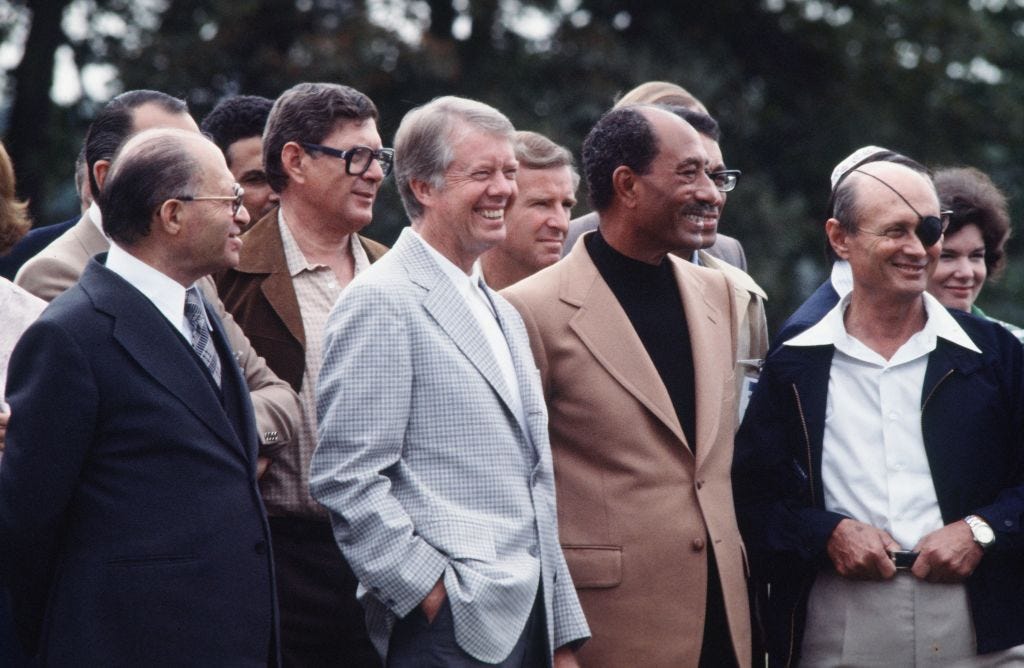
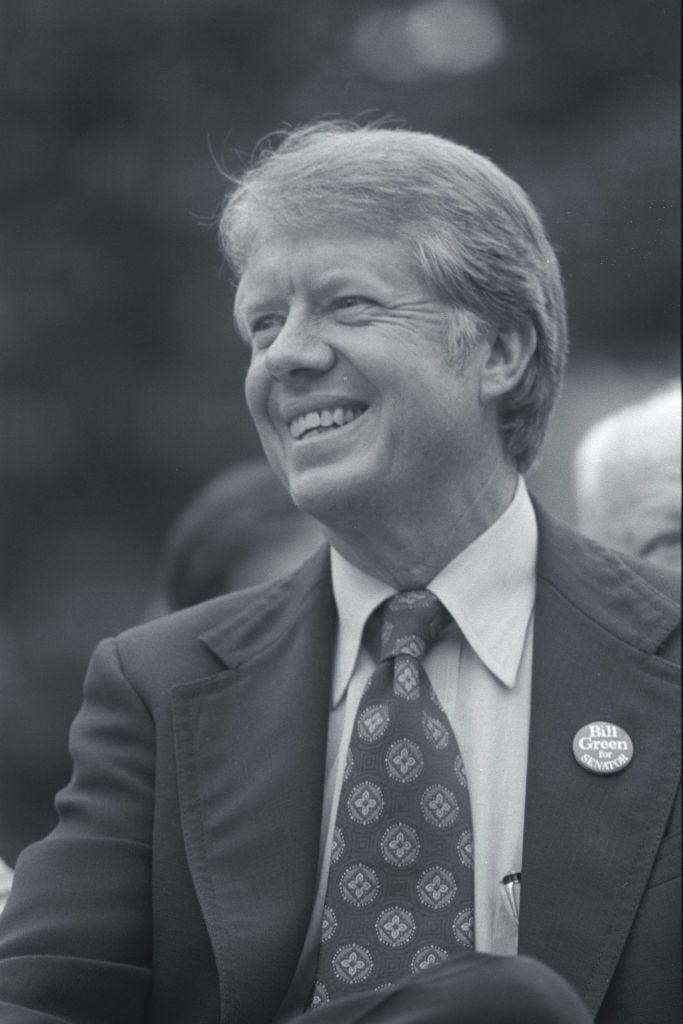
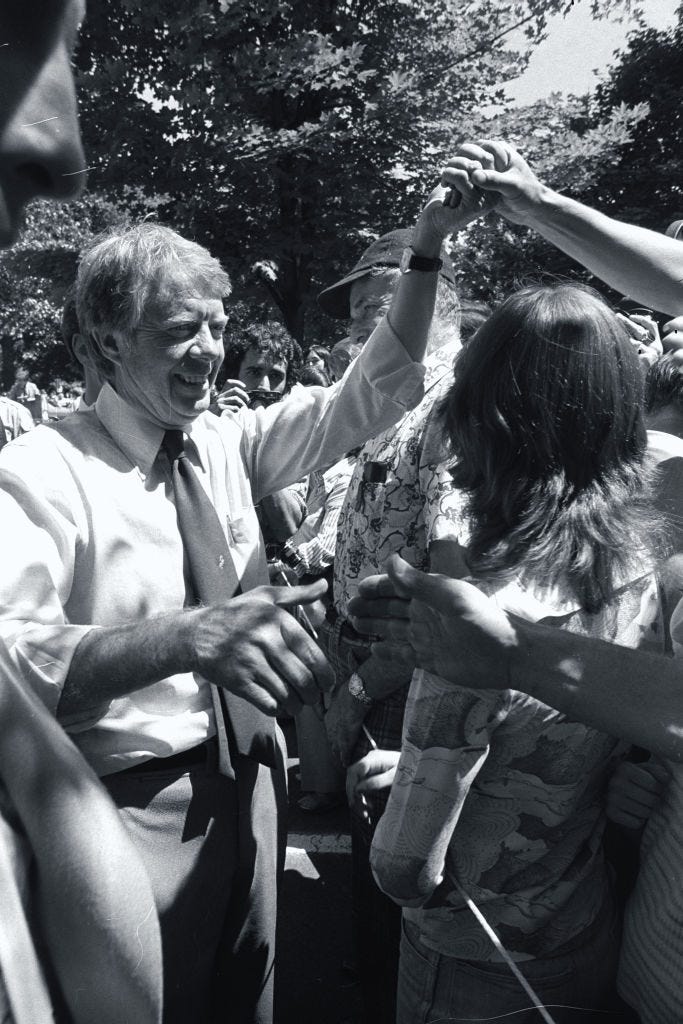
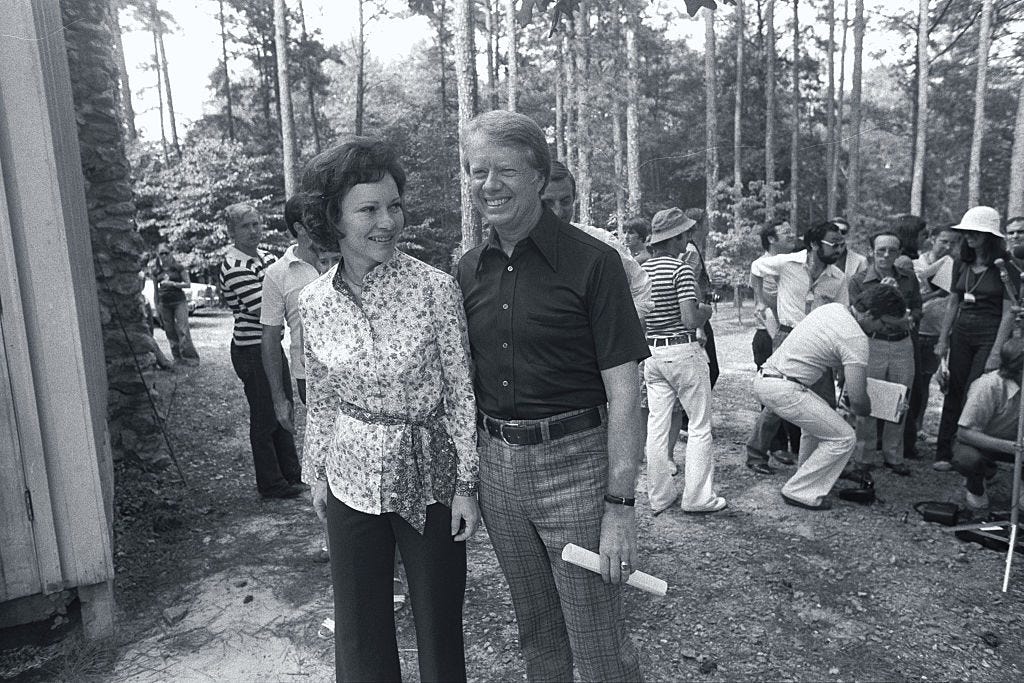
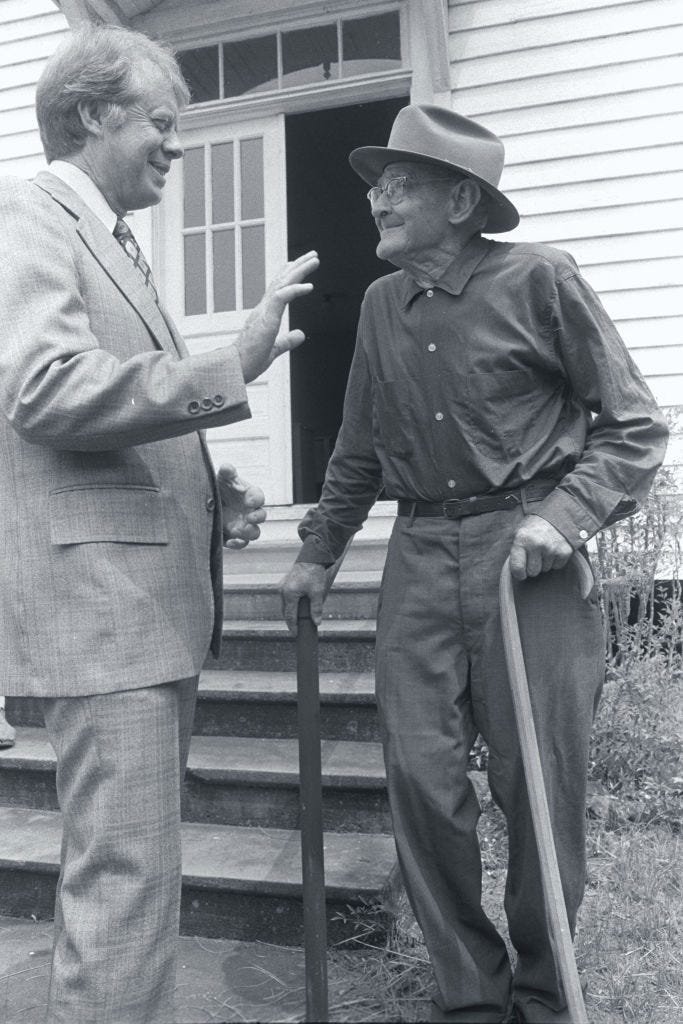
A lovely piece, and it leads me to two stories that I think will resonate.
One was Tom Wicker's. Late in 1974, a politician visited him in DC and told him that he would be president. Yes, no one knew him then, but he was a Democrat, and that meant he belonged to the winning party in 1976 because of Nixon and Ford. He was a southerner, and that could be a problem, but he would pick up the Wallace voters who realized he was too demagogic to win. Among other Democrats, Scoop Jackson had too much baggage, Ted Kennedy wouldn't run, and Hubert Humphrey had too many issues. He said the only one who could beat him was Walter Mondale, and he didn't think Mondale would run. Wicker chuckled ... then went on a political scouting trip early in 1976 and asked a gas station attendant in the South who he was supporting. Well, he replied, he was a Wallace man but knew Wallace could win, so he thought maybe that other southern candidate could win. And Wicker said he had forgotten the first rule of politics, which is that you never know. Jimmy Carter knew when he came to see Wicker that day.
The other is that Carter is one of two men elected president whose hand I have shaken (the other was Al Gore--ahem). He spoke at UNLV when I was a student in the mid-1980s and requested to meet students. We traipsed over to the hall where he would lecture later. Eugene Moehring, one of our history professors, taught our Modern US class and was asked to introduce him. Gene said that teaching a course on America since 1945 meant that he had 40 years to cover at that time, and couldn't spend a LOT of time on Carter's term, but he realized now just how much Carter accomplished. He went down a list much like the one here. Then he said, "And he got US hostages home from Iran without trading arms for them with Nicaragua." Gene said later that from offstage he heard the sound of someone clapping. He looked and Carter was standing there applauding that line, with that famous grin.
Jim, as Carter’s chief speech writer, you have an intimate insight into Jimmy Carter, the man and the president.
As an outsider, I have distinct personal impressions. Regarding integrity, I recall his promising to the American people that he would never lie to them. How different from Nixon, Trump, and other presidents!
I was especially interested in his Herculean efforts at Camp David to obtain an agreement between Menachem Begin and Anwar Sadat. (I had spent time with Sadat at his Pyramids home years before and had lunched with David Ben-Gurion, Israel’s first prime minister.)
What I recall is President Carter’s unflagging tenacity to bridge the vast gaps between Begin and Sadat. He should have been awarded the Nobel Peace Prize for his efforts and accomplishments.
The 1979 Egyptian-Israeli peace agreement was remarkable then and even more today given the current Middle Eastern situation.
We were in a period of ‘stagflation’ that permeated our entire country. He had the guts to bring in Paul Volcker, whose draconian measures, including inflation and unemployment in double digits and interest rates approaching 20%, broke stagflation in Reagan’s early years. Without committing to this politically damaging remedy, stagflation could have been a prolonged way of life.
I felt that President Carter sought to do what was right. His stance on the Panama Canal treaty was another such example. This was the right thing to do, after our long, jaded history with Panama and the canal. He was castigated by Reagan and Republicans, but persevered in obtaining Senate approval.
The Iranian hostage situation occurred on his watch. As a former Foreign Service Officer, I realized then that there was nothing that he could do to get them back safely.
From afar, I consider that how Carter conducted himself and what he accomplished for the United States was even more admirable after his presidency. He richly deserved the Nobel Peace Prize.
I find it remarkable that President Carter, after many months in hospice, has reached his 100th birthday. I hope that he achieves his wish to vote for Kamala Harris. This would be a fitting capstone to a remarkable life.